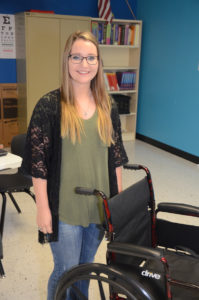
By Steve Brawner
© 2016 by Steve Brawner Communications, Inc.
Pea Ridge High School senior Tyler Cope, 17, was a waitress. Now, she’s a certified nursing assistant making $11 an hour. More importantly, she’s well on her way to a good-paying future in nursing. Thirty of her fellow students also have CNA licenses, while others are learning skills in other career fields.
Cope and her fellow students have that opportunity partly because of two sisters and a cup of coffee. The sisters both were carhops at a local Sonic, where Rick Neal, then the high school principal, would stop. One had been a good student and earned a high school diploma. The other had dropped out. Both were working the same job making $8 an hour, which bothered him.
“We’ve gotten (students) to a point of handing them that diploma and saying, ‘Head on out the door. You’re good. You’re good to go,’” Neal said. “But we’ve never really given them a true vision of where they can possibly go.”
When he became Pea Ridge’s superintendent, Neal began working to change that. He and other district leaders asked local employers and the Northwest Arkansas Council, a community and economic development group, about the jobs of the future in that part of the state. The answers – health care; marketing and logistics; industrial technology; plastic and metal fabrication; and multimedia productions – formed the basis for five educational pathways students like Cope can choose to take.
The school district obtained a charter from the Arkansas Department of Education granting waivers from regulations that interfered with the vision. One allows students to advance through core courses at their own pace – not based on how many days they’ve sat in a chair.
As a result, about half the school’s juniors and seniors, including Cope, are part of the Pea Ridge Manufacturing and Business Academy, or PRIMBA. They take their core courses (English, math, etc.) in the morning largely on their own with guidance from teachers, and test when they’re ready. They advance to a new unit only when they score 90 percent. Afternoons are focused on their pathways and their futures.
The school district has formed partnerships with 20-25 area employers who have a real stake in what’s happening. They even have input into which teachers are hired. Because trust and involvement have been created, companies are coming to the school to recruit students to work real jobs.
Meanwhile, all students are on a flexible schedule with independent learning time built into their days. They’re free to do homework or get help from a teacher then. Teachers have more independent time, too. Busy work and babysitting have been taken out of classroom time, which focuses on deeper instruction. AP English teacher Roxanne Enix said she feels more respected this way.
Yes, administrators gave up some control. In return, teachers and students have more ownership of the educational process. It’s too early to track test scores, but student absences fell from 3,964 in 2014 to 3,205 in 2015, while teacher absences fell from 408 to 295.
It should be pointed out that one of the reasons Pea Ridge took this path was because it knew parents had a choice. Most work in nearby Bentonville or Rogers and can drop off their children at school there.
“We compete,” Neal said. “Yes, we do. … It motivates us, and what I tell them is we’re going to put a product out there where our people do not leave and they want to bring their kids here.”
One last point: Most of us think we know what’s wrong with all public schools because we graduated from one. The truth is that each school is different, and many are quite different than what you and I experienced. What we had when we were growing up was an uninspiring industrial model where much of our time was spent passively memorizing, regurgitating, and forgetting often trivial information. Many of today’s schools, on the other hand, have innovative programs tied to local needs. Students are doing project-based learning meant to more closely resemble the work world. Career-based education – once banished to a vo-tech building in the back of the campus – is now a focus.
Has Arkansas fixed education? No way. Some schools are stuck in traditional mindsets. Students have not moved up the ladder in international tests.
Just know that people are trying and having some success – including Pea Ridge, which, a few years ago, decided that a high school diploma should lead young adults to opportunities, not fast food jobs.
Related: In West Memphis, it’s all connected.
Excellent article!
Every educational opportunity should spark and motivate, not just with self-satisfaction in success, but also with a decent wage!
Thanks for reading and commenting, Kathy.
Thank you for a thoughtful article.
Thanks, Mrs. Ross.